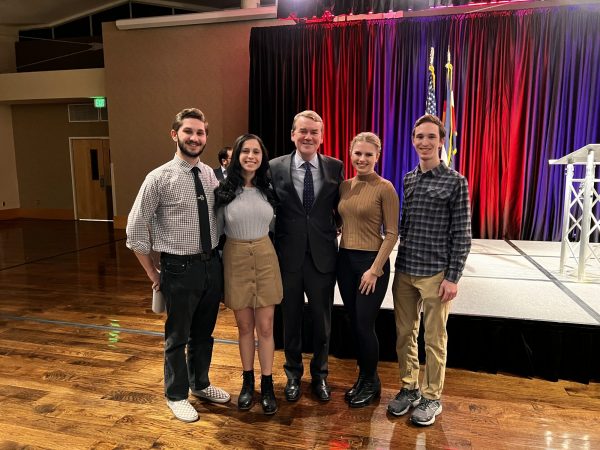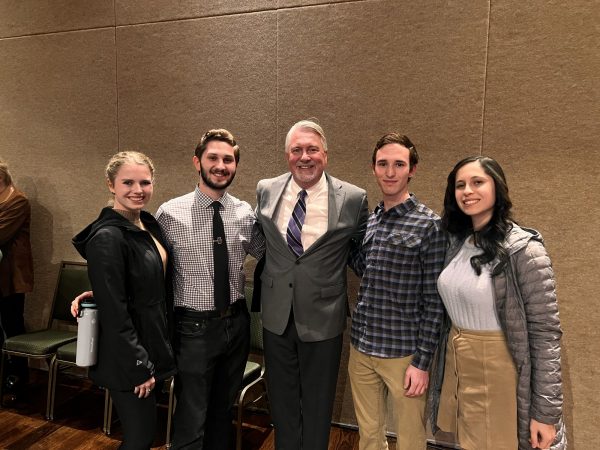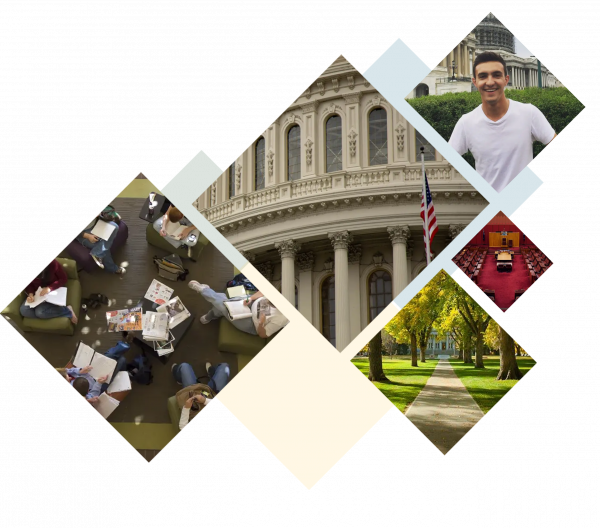On the evening of October 28, the Lory Student Center Ballroom at Colorado State University was set to host the final scheduled public debate between the two front-runners for Colorado’s U.S. Senate seat, Democratic incumbent Michael Bennet and Republican challenger Joe O’Dea. With only forty audience members in attendance, it was an intimate setting for the four CSU political science students selected to attend the live debate: Aidan Lyde, Natalia Goncharova, Addison Parman, and Jackson Feely.
Seated in close proximity to both the moderators and candidates, the students got a glimpse into the behind-the-scenes process of a televised debate as well as an up-close account of the candidates during the event. They watched in anticipation as moderators greeted audience members, and spoke with other politicians and public figures in the room as everyone awaited the on-air countdown. “I think what fascinated me the most was being able to see the candidate’s full reaction and body language when responding to a question or debating their opponent. The slight gestures and facial expressions they made are something that can often be missed on television, but can tell you a lot about what they’re thinking at that moment,” says Lyde.
The candidates spent the hour-long event discussing their stances on important policy issues, and sharing their visions for improving the office in an attempt to sway Colorado voters prior to election day. “Not only were the candidates posed questions by the moderators, but they were also given several opportunities to ask direct questions to each other. This was a unique characteristic of the debate that, I believe, allowed for a more thoughtful evaluation of the candidates,” says Parman. From Lyde’s perspective, “Michael Bennett seemed to touch more on policy issues, and made connections between debate questions and issues he had discussed with local constituents, whereas Joe O’Dea relied on the same talking points throughout the debate regarding Bennett’s voting record, performance, and spending.” Feely believes “the candid and prompt responses necessitated by the debate illustrated each candidate’s demeanor, level of intellect, and mental acuity.”
In a predominantly contentious final debate, Bennet and O’Dea found some common ground on issues around gun control, infrastructure, and water policy. “The one topic that I was very interested in hearing each candidate’s perspective on was water. I held an internship at the U.S. Department of the Interior researching water-related challenges in the Colorado River Basin, and my senior honors thesis discusses water augmentation in the Lower Colorado River Basin, so I was well-informed about the topic. I was quite surprised when I not only agreed with most of what was said, but also that both candidates agreed with each other as well. That was probably the one debate topic of the night where there was no disagreement between the candidates,” says Lyde.
Following the conclusion of the televised debate, the students had the opportunity to meet both candidates in person. “Bennet asked each of us where we were from and what influenced our decision to come to Colorado/CSU, while O’Dea was offering opportunities to work on his campaign,” says Lyde. The students found both Bennett and O’dea approachable and enthusiastic to get to know them. “We were asked individual questions about our background and our future interests, and it felt like they truly cared about who their possible voters were,” says Goncharova.

“My attendance at this debate was the first real opportunity I’ve had to meet political candidates of such high stature – I was lucky enough to be seated next to Susan, Michael Bennet’s partner, who very graciously gave me the opportunity to shake Senator Bennet’s hand and take a photo following the debate. It was the highlight of my evening, and I will never forget the experience of being so close to such an influential policymaker – at that moment, I felt my years of studying political science beginning to pay off,” says Parman.

Televised debates have long been used as a forum for voters to evaluate candidates and remain an important part of the election process. While the value of debates has recently been in question, they continue to provide an opportunity to evaluate a candidate’s stance on major issues and are an effective way to promote civic engagement. “Debates are crucial to seeing the true character of a candidate, and how they communicate both politically and with an audience. When faced with a limited time to speak, candidates must present the issues that matter most to them, and people are more clearly able to see their values and the extent to which they will uphold them. It is difficult to gain that understanding outside of a debate context, “ says Goncharova.The Senate debate gave Lyde the opportunity to “assess the way they spoke and approached a question, the way they responded to criticism, how they treated their opponent, the nuances of their policy positions, and their general knowledge about the state, constituents, and office they are running for.”
